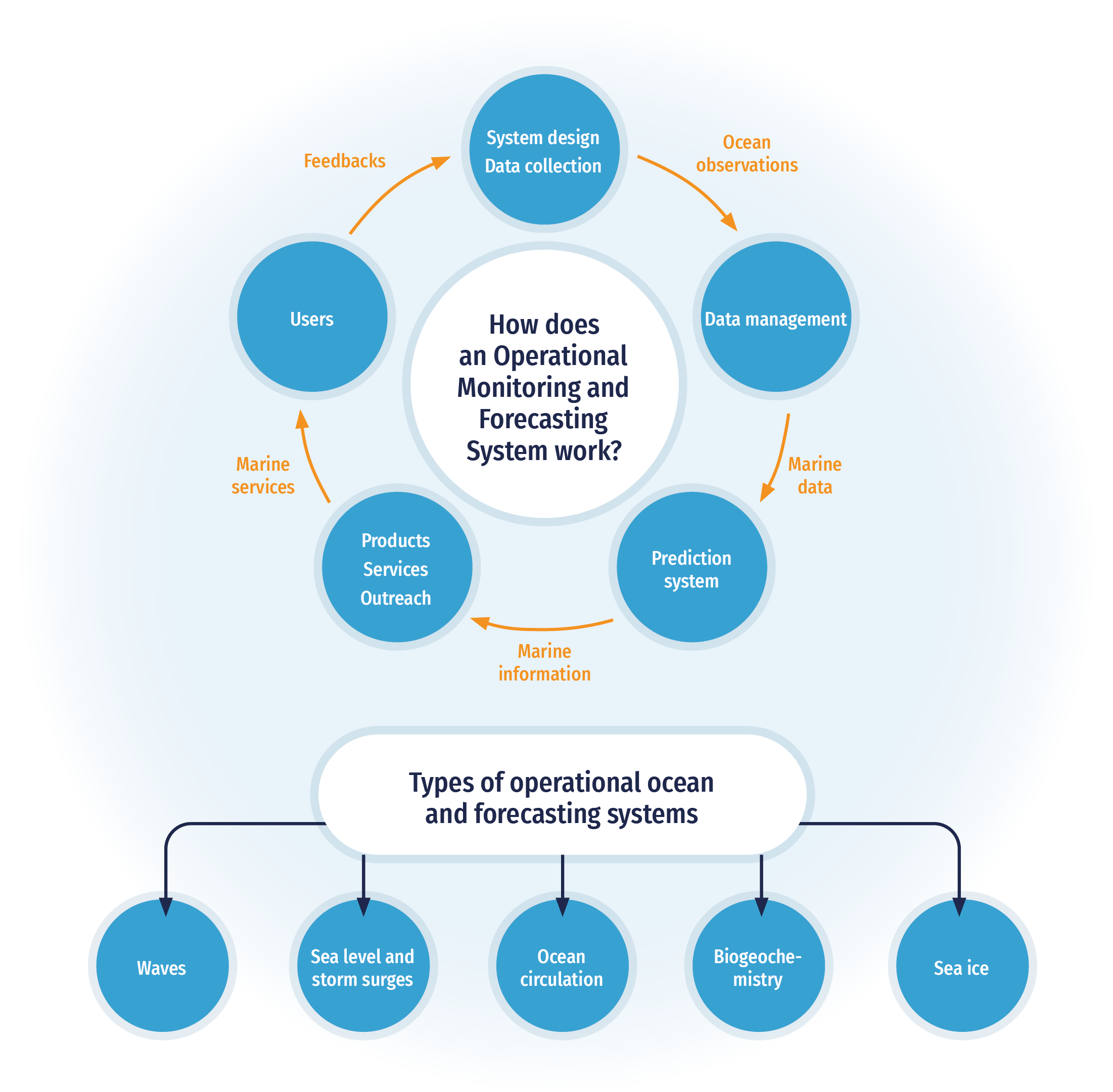Discover operational oceanography
What is Operational Oceanography?
 It is difficult to accurately estimate the importance of the ocean for humankind and animal life on our planet. Covering 70% of the Earth’s surface, the ocean is the world’s largest source of oxygen. It absorbs 50 times more carbon dioxide than the atmosphere. Climate is regulated by ocean heat transport, making our world a habitable place. For human beings, the ocean is also a source of food, economic resources, travel, and leisure activities; the economic activities associated with the ocean are numerous and of crucial importance. These facts and figures highlight why operational ocean monitoring and forecasting can be considered a vital discipline.
It is difficult to accurately estimate the importance of the ocean for humankind and animal life on our planet. Covering 70% of the Earth’s surface, the ocean is the world’s largest source of oxygen. It absorbs 50 times more carbon dioxide than the atmosphere. Climate is regulated by ocean heat transport, making our world a habitable place. For human beings, the ocean is also a source of food, economic resources, travel, and leisure activities; the economic activities associated with the ocean are numerous and of crucial importance. These facts and figures highlight why operational ocean monitoring and forecasting can be considered a vital discipline.
Operational Oceanography, defined as the set of activities for the generation of products and services providing information on the marine and coastal environment, is based on two main pillars:
- The monitoring element focuses on the systematic and long-term routine measurements of oceans and atmosphere, and their rapid interpretation and dissemination.
- The prediction component uses ocean models to generate a variety of products: nowcasts (describing the present ocean state provided by analyses); forecasts (the future condition of the ocean) or hindcasts (the ocean’s past states, provided by reanalysis).
Guide on Implementing Operational Ocean Monitoring and Forecasting Systems
Expert Team on Operational Ocean Forecasting Systems (ETOOFS)
 At the request of the Intergovernmental Oceanographic Commission of the UNESCO (IOC-UNESCO) and the World Meteorological Organisation (WMO), the Global Ocean Observing System (GOOS) and its Expert Team on Operational Ocean Forecasting Systems have published a guide on « Implementing Operational Ocean Monitoring and Forecasting Systems ».
At the request of the Intergovernmental Oceanographic Commission of the UNESCO (IOC-UNESCO) and the World Meteorological Organisation (WMO), the Global Ocean Observing System (GOOS) and its Expert Team on Operational Ocean Forecasting Systems have published a guide on « Implementing Operational Ocean Monitoring and Forecasting Systems ».
It aims to promote the development of new marine forecasting systems around the globe along with the improvement of the existing ones. It provides an overview of the entire value chain of an operational ocean monitoring and forecasting system and presents international standards and best practices for setting up such a service.
The Expert Team on Operational Ocean Forecasting Systems (ETOOFS)
The Expert Team on Operational Ocean Forecasting Systems (ETOOFS) is a component of the Global Ocean Observing System (GOOS), led by the Intergovernmental Oceanographic Commission (IOC-UNESCO) and co-sponsored by the World Meteorological Organisation (WMO), the United Nations Environmental Programme (UNEP), and the International Science Council (ISC). Mercator Ocean International supports GOOS in the implementation of ETOOFS, and Pierre Bahurel, CEO of Mercator Ocean International, is the ETOOFS Chair.
The ETOOFS mission is to support and offer guidance to develop efficient, reliable and interoperable ocean monitoring and forecasting systems – essential prerequisites for tackling climatic, environmental and societal challenges. Through the forthcoming publication of a technical guide, its summary booklet, or the holding of training and workshops, ETOOFS experts are sharing their experience to promote and facilitate the support and development of operational and forecasting systems and their adoption in the wider community.
